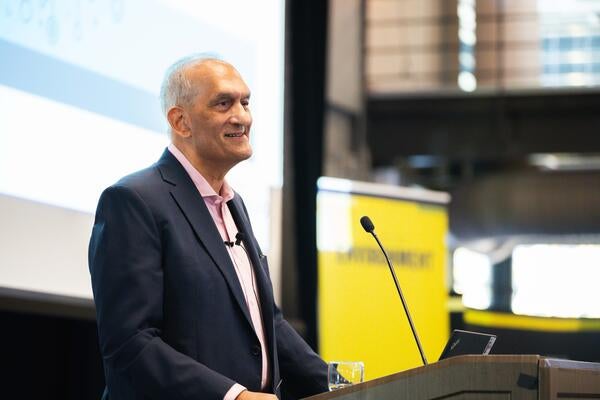
"It gets into your bones:" Prof returns to South Africa to teach
Larry Swatuk teaches water security at the University of Western Cape. He says living and working in Africa is life-changing.

Larry Swatuk teaches water security at the University of Western Cape. He says living and working in Africa is life-changing.
By Bob Burtt Communications and Public AffairsThis summer, Larry Swatuk will pack his bags, just as he has for the last 12 years, and return to the University of Western Cape in South Africa where he’ll teach a three-week course in water security pro bono.
 Larry Swatuk, Director of the International Development Program at Waterloo’s Faculty of the Environment
Larry Swatuk, Director of the International Development Program at Waterloo’s Faculty of the Environment
“It is the right thing to do, a way to give back and a chance to stay on top of the research,” says Swatuk, director of the International Development Program at Waterloo’s Faculty of the Environment.
The course he’ll teach in South Africa is part of a graduate degree program offered at a network of universities in Africa and is the same one he teaches here in Waterloo.
Water security
Water security means different things to different people.
“Cities need water and they are vulnerable if they have inadequate supplies for various activities,” says Swatuk. “Some of the questions in urban areas are around pollution and over extraction of groundwater supplies.
In rural areas the realities are different: Villagers depend on rainfall for agriculture, food security and livelihoods. “If there is no water for you or me in Waterloo, we might be stressed but not really threatened, but if you are a rural farmer out there in the middle of a savanna and the rains fail, it can put your life at risk.”
Swatuk talks about how to ensure enough water - “water when we want it, where we want it and in the quantity and quality that it is needed.”
Roots go deep
Swatuk spent 14 years living and working in Africa, most of them teaching at the University of Botswana, before moving back to Waterloo in 2008.
So where does the passion for Africa come from?
“It was an accident,” he says with a chuckle, an accident that was to change his life forever. Swatuk was a student at the University of Windsor when he decided to apply for a placement with Crossroads International, a non-profit organization that provides volunteer support globally to help eradicate poverty.
Swatuk had visions of going to Asia but ended up being sent to Lesotho, a Kingdom surrounded by South Africa.
Swatuk says: “I can’t even begin to explain ways in which it has changed my life. It gets into your bones.”

Read more
Here are the people and events behind some of this year’s most compelling Waterloo stories

Read more
Researchers awarded funding to investigate ecology, climate change, repatriation, health and well-being through cultural and historical lens

Read more
Industry partners and talented Waterloo students envisioned a decarbonized future and how they can drive transformative change in the energy sector
The University of Waterloo acknowledges that much of our work takes place on the traditional territory of the Neutral, Anishinaabeg, and Haudenosaunee peoples. Our main campus is situated on the Haldimand Tract, the land granted to the Six Nations that includes six miles on each side of the Grand River. Our active work toward reconciliation takes place across our campuses through research, learning, teaching, and community building, and is co-ordinated within the Office of Indigenous Relations.